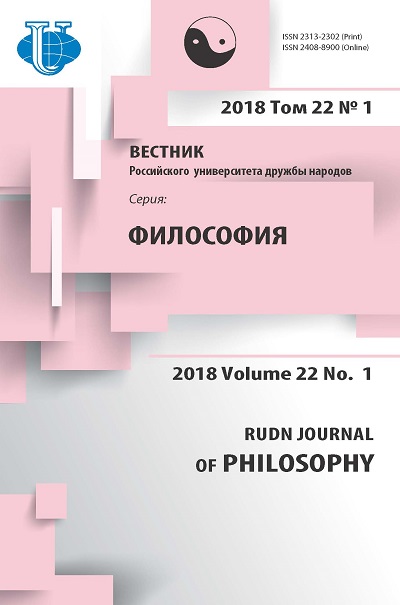A Satyagrahi as a Subject of Social Development in M.K. Gandhi’s Philosophy
- Authors: Bitinayte EA1
-
Affiliations:
- Krasnodar State Institute of Culture
- Issue: Vol 22, No 1 (2018)
- Pages: 30-38
- Section: HISTORY OF INDIAN PHILOSOPHY
- URL: https://journals.rudn.ru/philosophy/article/view/18139
- DOI: https://doi.org/10.22363/2313-2302-2018-22-1-30-38
Cite item
Full Text
Abstract
The article deals with representatives of creative minority (the term by H. Bergson, A.J. Toynbee) in the process of social development. Satyagrahis play the similar role in M.K. Gandhi’s philosophy. This term originates from the central conception of Indian thinker - Satyagraha . It means the calling for resistance of moral developed person to all injustice around him by means of his soul-force. Gandhi’s image of an ideal man and his understanding of the role of such man in social-dynamical processes shows that philosopher’s intellectual and cultural features influenced his views. So, being the thinker, formed on the joint of two cultures (culture of traditional society and Modernity), Gandhi gives to his image of an ideal man Eastern and Western qualities. He offers to combine the moral rigor of traditional Indian ascetic with social activity, freedom and sense of personal responsibility, which are characteristic for individualistic ethics of Modernity. At the same time he rejects the understanding of social development as a technical progress, which is widespread in the West. The thinker connects this process with the personal improvement and harmonization of social relationships. The latter is impossible without participation of mediators between different social forces. Realizing this fact, Gandhi called his followers to become mediators between quarreling religious communities, castes and political parties in order to conciliate them. Such understanding of social development was in large part determined by social image of the thinker. Being the person formed on the crossroad of intercultural communications, Gandhi himself played the role of mediator between the Hindus and Mussulmans, between high-caste Hindus and untouchables, between different branches of Indian national congress, between economical elites and pure masses.
About the authors
E A Bitinayte
Krasnodar State Institute of Culture
Author for correspondence.
Email: bihelenite@gmail.com
кандидат философских наук, преподаватель кафедры социально-культурной деятельности факультета социально-культурной деятельности и туризма
40-let Pobedy str., 33, Krasnodar, 350072References
- Al’bedil’ MF. Indiya: bespredel’naya mudrost’. Moscow: Aleteja; 2005. (In Russ).
- Bitinayte EA. Kontseptsiya obshchestvennogo razvitiya M. K. Gandhi: opyt filosofskoy rekonstruktsii. Vestnik Russkoy hristianskoy gumanitarnoy akademii. 2016;17(1):28—34. (In Russ).
- Bhagavadgita. Per. s sanskr., issled. i primech. VS Sementsova. Moscow: “Vostochnaya literatura” RAN; 1999. (In Russ).
- Devyatkin SV. Iskusstvo satyagrahi. In: Opyt nenasiliya v XX stoletii. Moscow: Aslan; 1996. p. 16—65. (In Russ).
- Zhordis K. Mahatma Gandhi. Moscow: Molodaya gvardiya; Palimpsest; 2013. (In Russ).
- Ioseleva MA. Problema lichnosti v induizme. Chetvertye Torchinovskie chteniya. S.-Peterburg, 7—10 fevralya 2007 g. SPb.: Izd-vo S.-Peterb. un-ta; 2007. p. 237—244. (In Russ).
- Rybakov RB. Nenasil’stvennaya bor’ba za mir bez nasiliya (Ahimsa v indiyskoy traditsii i v uchenii M.K. Gandhi) In: Patsifizm v istorii. Idei i dvizheniya mira. Moscow: Institut vseobshchey istorii RAN; 1998. p. 122—148. (In Russ).
- Skorokhodova TG. Bengal’skoe Vozrozhdenie. Ocherki istorii sotsiokul’turnogo sinteza v indiyskoy filosofskoy mysli Novogo vremeni. SPb: Peterburgskoe Vostokovedenie; 2008. (In Russ).
- Skorokhodova TG. Problema lichnosti v sotsial’noy filosofii Bengal’skogo Vozrozhdeniya In: XII Sotsiologicheskie chteniya prepodavateley, aspirantov i studentov. Mezhvuzovskiy sbornik nauchnyh trudov. Penza: PGPU; 2010. S. 19—33. (In Russ).
- Stepanyants MT. Filosofiya nenasiliya: uroki gandhizma. Moscow: “Znanie” Rossiyskoy Federatsii; 1992. (In Russ).
- Gandhi Mahatma. The Collected Works. In 100 vols. New Delhi: Government of India. The Publications Division. Ministry of Information and Broadcasting; 1958—1994.
- Gandhi MK. Speeches and Writings. Madras: G.A. Natesan; 1922.
- Gangrade KD. Gandhian Approach to Development and Social Work. New Delhi: Concept Publishing Company; 2005.
- Iyer RN. The Moral and Political Thought of Mahatma Gandhi. Delhi: Oxford University Press; 1973.
- Roy R. Self and Society: A Study in Gandhian Thought. New Delhi: Sage Publications; 1985.
















